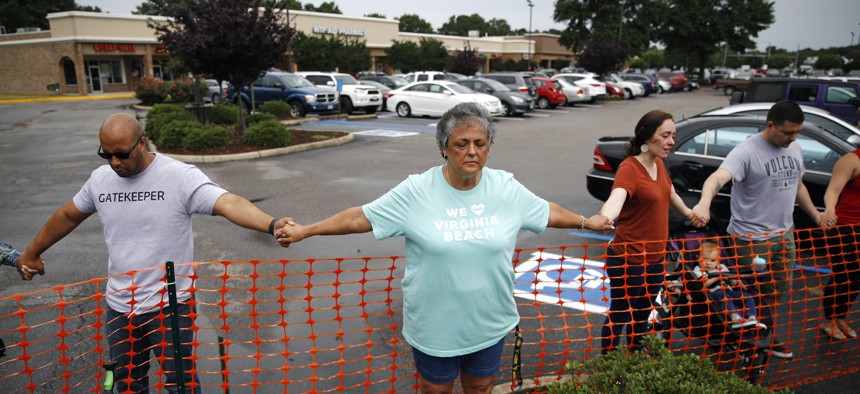Offering a Place for City Workers to Heal After a Mass Shooting

In this Saturday, June 1, 2019 file photo, Lisa Dunaway, center, of Virginia Beach, Va., holds hands with other mourners during a vigil in response to a fatal shooting at a municipal building in Virginia Beach, Va. AP Photo/Patrick Semansky
Virginia Beach has opened a resiliency center to provide mental health resources to all victims impacted by the May 31 attack.
VIRGINIA BEACH – In the days after a city engineer opened fire inside a municipal building here in May, killing 12 people and injuring four others, much of the local government’s immediate challenge was on helping victims and their families, as well as keeping city services up and running.
It wasn’t until weeks later that officials realized the degree of mental health support that might be necessary to help government workers cope with the tragedy, said Steve Cover, Virginia Beach’s deputy city manager of public safety. That’s when they learned about a U.S. Department of Justice grant that could be used to establish a resiliency center to provide counseling and mental health resources.
Five months later, the city and partner organization Sentara Healthcare opened the Virginia Beach Strong Center, where city workers and community members can go for services, from individual counselling sessions to art therapy to anger management classes.
“It’s a wide range of people, but the levels at which they were all affected and the things they need are all different,” Cover said. “The center will pay dividends in that it is a single point of entry into the system.”
The concept of resiliency centers gained traction after the Sept. 11 terrorist attacks, said April Naturale, a traumatic stress specialist and consultant who worked with Virginia Beach on setting up the center. Communities across the country, including Las Vegas and Newtown, Connecticut, have opened such centers in the wake of similar tragedies.
The Virginia Beach center, which occupies a second-floor office space in a shopping center complex just up the road from city hall, opened in late October to great fanfare, with a ribbon-cutting attended by Governor Ralph Northam.
More than 200 visitors stopped by during open house sessions and during the first two weeks of operation, said Rosanne Foggin, the center’s manager. Of the two to three group sessions offered daily, the art and animal therapy sessions have proved the most popular so far, she said.
The center welcomes everyone, from government workers who had to evacuate during the attack to victims’ surviving family members to community members who may have lingering anxiety over the shooting. Recognizing that the shooting occurred in a building that was accessible to the public, Cover said the city wanted to make sure the community at large, and not just city workers, could utilize the services offered. More than 400 people were inside the public works building at the time of the shooting and could have either witnessed the violence or had to evacuate or take cover to avoid it.
“Our city is still hurting,” he said.
While the concept of resiliency centers is not unique, each community has different needs that can be addressed through them, Naturale said.
Allowing for flexibility in the offerings will be key to its success in catering to city workers, said Alison Land, the vice president of behavioral health services at Sentara.
Individuals interested in utilizing the center’s resources can stop by for group sessions or complete an intake evaluation with staff to assess what other resources might be beneficial for them. Staff are available to conduct group sessions for city agencies at department offices as well and they plan to eventually have at least one staff member work from 11 p.m. to 7 a.m. to accommodate first responders who work non-traditional hours. A city liaison is tasked to coordinate on matters under the city’s purview, such as workers compensation.
“We don’t know what everybody’s needs are, so as they come in we do a really individualized intake so we know the true need they are facing,” Land said. “It may not be a mental health issue. It may be a social issue, a financial issue, a job training issue, a legal issue. We will be connecting them and navigating them through whatever their need is.”
Foggin said the center staff are also listening closely to community feedback during the first few weeks in operation in order to develop additional resources if needed.
The shooting has prompted self-reflection on the part of top city government officials as well. Virginia Beach hired an independent security risk firm to evaluate its policies and response to the incident. The firm released a 262-page report this week, which made recommendations on workplace violence prevention, as well as physical building security.
Given the circumstances of the shooting, Virginia Beach realized early on that it was important to have some separation between the city and the mental health services offered, Cover said. Partnering with a third-party to provide those mental health resources, as the city did with Sentara, is important in establishing boundaries and ensuring privacy, especially when many of the center’s clients are expected to be government workers, Naturale said.
The $3 million DOJ grant that is paying for the center is expected to fund its operations for approximately three years. But given the toll the shooting took on the community, Land said there is an expectation that victims will need resources beyond that time. Part of the center’s mission will be to help train community groups and mental health professionals who can carry on the work after the center closes, Land said.
“We’ll also be working with community partners because just because three years is over doesn’t mean our community will have healed completely,” Land said.
PREVIOUSLY on Route Fifty:
Andrea Noble is a staff correspondent for Route Fifty.
NEXT STORY: A New Proposal Envisions Federal Help for States and Localities to Reduce Prison Populations





